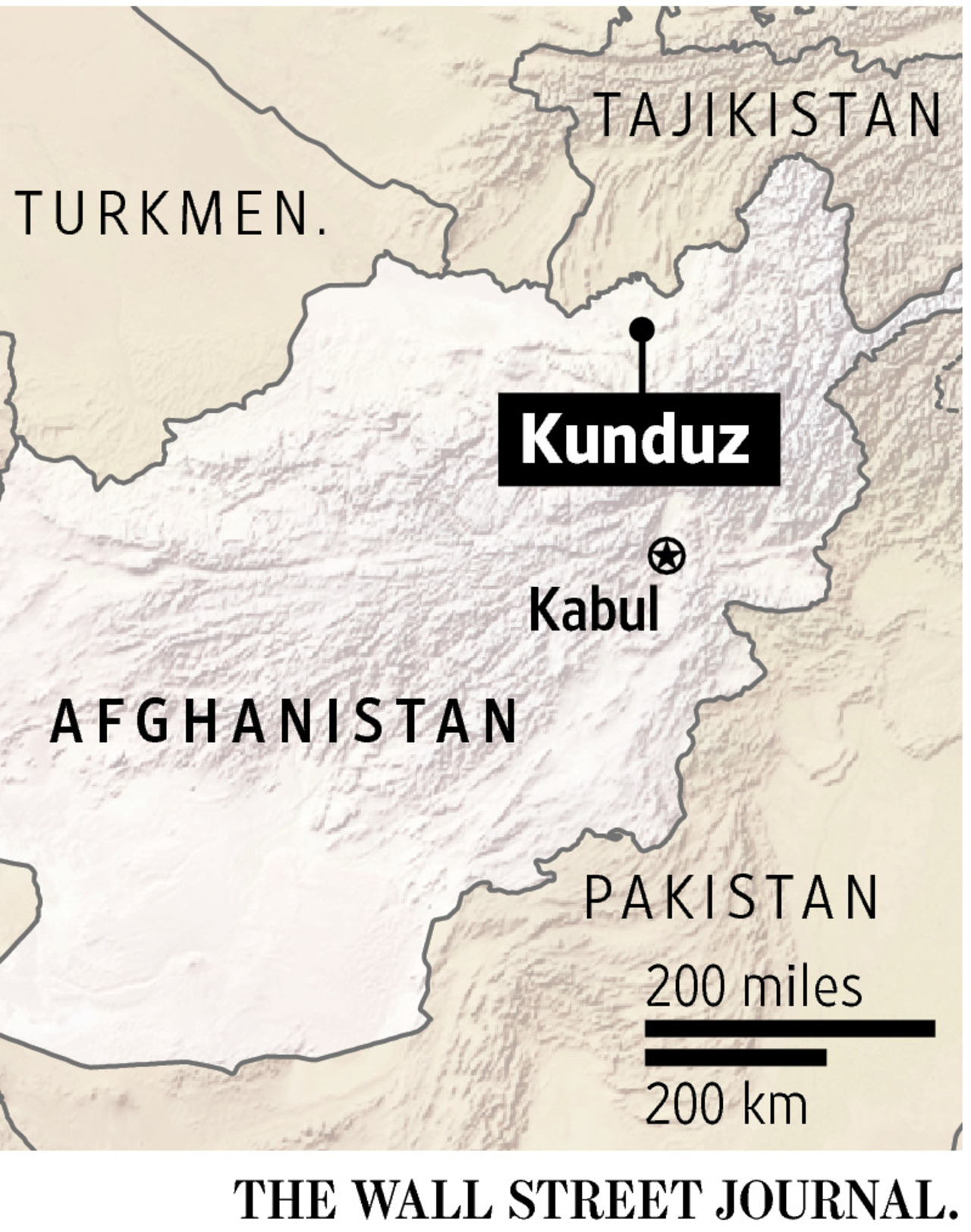http://www.wsj.com/articles/afghanistan-city-of-kunduz-largely-under-taliban-control-1443447706
Taliban Seize Control of Kunduz, Key Stronghold in Northern Afghanistan
Storming of Kunduz marks the first time in 14 years that a major Afghan city has fallen to the insurgency
By Ehsanullah Amiri, Margherita Stancati and Habib Khan Totakhil
Sept. 28, 2015
Taliban militants seized control of most of the northern city of Kunduz, residents and officials said, marking the first major Afghan city to fall to the insurgency in 14 years of war.
Insurgents stormed the city from three sides early Monday, armed with AK-47 rifles and heavy machine guns and riding vehicles stolen from Afghan troops.
Government forces, who managed to avert a similar attack earlier this year, initially pushed the Taliban to the city's outskirts. But by late afternoon, the militants had taken most government buildings, including the police headquarters and the provincial governor's compound, residents and officials said.
Insurgents hoisted their trademark white flags in the city's main square, while government forces held only the airport and a nearby hill. The Taliban also stormed the prison in Kunduz, freeing more than 600 inmates--about 140 of whom are insurgents, a security official said.
"We are taking serious steps to retake Kunduz," Afghan Army Gen. Murad Ali Murad, who is in charge of the army's day-to-day operations, told reporters on Monday night. "What happened is intolerable, and the situation will change very soon."
The fall of the city marks a devastating blow to Afghanistan's Western-backed government and its security forces, which have largely fought on their own since U.S. and allied forces mostly ended their combat role last year.
Kunduz, one of the largest cities in northern Afghanistan, lies on a strategically and economically important trade route close to the border with Tajikistan. Control of Kunduz also carries symbolic value: The city was one of the last Taliban enclaves to fall during the 2001 U.S.-led invasion.
By sunset, members of the Afghan army's elite special-forces units, equipped with night-vision goggles, had reached the city and were leading the counteroffensive. On loudspeakers they advised people to stay indoors to avoid injury.
A Kunduz hospital operated by the aid group Doctors Without Borders on Monday received 102 wounded patients, 36 of whom were in critical condition. "Our surgeons have been working nonstop to treat patients with gunshot wounds," said Guilhem Molinie, the group's country head.
The fall of Kunduz, even if temporary, would complicate a priority of the government of Afghan President Ashraf Ghani: restarting peace talks with the Taliban. Those negotiations stalled after the death of Taliban founder, Mullah Mohammad Omar, became known in July. The revelation triggered a leadership crisis [1] within the movement.
Now, the Afghan government faces the difficult task of convincing insurgents they can gain more at the negotiating table than on the battlefield, says Graeme Smith, an Afghanistan expert with International Crisis Group. "Even if Afghan security forces retake Kunduz and clean up the charred mess inside the police headquarters, the political damage is done," he said.
This is the second time this year that the Taliban have sought to capture Kunduz. When the Taliban closed in on the provincial capital in April, they caught Afghan forces off guard but they retreated before they could enter the city. Kunduz province has been volatile since.
With the Taliban now inside the city, it will be harder to push them out. Taliban fighters frequently seek shelter in the homes of civilians, and Afghan forces can't use heavy artillery in densely populated areas. The Taliban boasted about their conquest and quickly sought to position themselves as the legitimate rules of Kunduz city, saying they would protect civilians living there.
"The residents of Kunduz should be assured of their security; they should not be concerned," the Taliban's new leader, Mullah Akhtar Mansour, said in a statement. "They are urged to continue their normal lives."
In a separate statement addressed to nongovernmental organizations and private businesses, the Taliban said they should continue to operate normally--and provided a hotline for complaints.
Still residents said they were afraid. "We are stuck in our homes, we cannot go out. The Taliban are on the streets," said Khan Shirin Jafari, a resident of the city and former member of the provincial council. "Kunduz residents are shocked."
U.S. and allied forces largely ended their combat role on Dec. 31, 2014 and there are just 17,000 foreign troops left in Afghanistan. A military official with the U.S.-led coalition said foreign troops stationed in the northern city of Mazar-e Sharif are advising and assisting their Afghan partners. [2] He said U.S. forces haven't carried out any airstrikes.
The governor of Kunduz province, Mohammad Omer Safi, wasn't in the city at the time of Monday's assault. In a message, he said the city fell "due to lack of care of the central government," adding that he had repeatedly raised the alarm with Kabul. "You could say someone intentionally handed over the province to the Taliban," he said.
On their website, the Taliban released a video that purportedly showed policemen fleeing from the city in pickup trucks. Mullah Mansour said the Taliban would offer amnesty to Afghan troops and government employees who surrender.
Footage on social media posted by a resident of Kunduz showed Taliban fighters in the streets of the city. When asked what they want, one of the militants replies: "We want to serve the people and they have to help us. We want to establish Shariah law."
Write to Margherita Stancati at margherita.stancati@wsj.com

[1]
http://www.wsj.com/articles/taliban-says-leadership-struggle-has-been-resolved-1442342051
[2]
http://www.wsj.com/articles/treading-line-between-war-and-peace-u-s-special-forces-groom-afghan-troops-1440782892
 [1] http://www.wsj.com/articles/taliban-says-leadership-struggle-has-been-resolved-1442342051
[2] http://www.wsj.com/articles/treading-line-between-war-and-peace-u-s-special-forces-groom-afghan-troops-1440782892
[1] http://www.wsj.com/articles/taliban-says-leadership-struggle-has-been-resolved-1442342051
[2] http://www.wsj.com/articles/treading-line-between-war-and-peace-u-s-special-forces-groom-afghan-troops-1440782892
 [1] http://www.wsj.com/articles/taliban-says-leadership-struggle-has-been-resolved-1442342051
[2] http://www.wsj.com/articles/treading-line-between-war-and-peace-u-s-special-forces-groom-afghan-troops-1440782892
[1] http://www.wsj.com/articles/taliban-says-leadership-struggle-has-been-resolved-1442342051
[2] http://www.wsj.com/articles/treading-line-between-war-and-peace-u-s-special-forces-groom-afghan-troops-1440782892